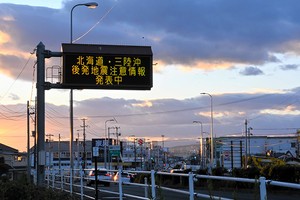Vox Populi, Vox Dei is a daily column that runs on Page 1 of The Asahi Shimbun.
April 6, 2023 at 14:06 JST
 Cherry blossom trees are in full bloom on April 1 along the “sakura tunnel” street in the Yonomori district of Tomioka, Fukushima Prefecture. (Sayuri Ide)
Cherry blossom trees are in full bloom on April 1 along the “sakura tunnel” street in the Yonomori district of Tomioka, Fukushima Prefecture. (Sayuri Ide)
On the trail of the fast-moving “cherry blossom front,” I went to Fukushima Prefecture last weekend. My destination was the Yonomori district in the town of Tomioka.
I walked through a roughly two-kilometer-long tunnel formed by flowering cherry blossom trees. Their pale pink blossoms were in full bloom on the overhanging branches, which firmly thrust themselves into the deep blue sky.
As I gazed up, I felt as if my eyes were stung by the sheer beauty of spring. It was simply breathtaking.
The day of my visit coincided with the lifting, at long last, of the evacuation order that was issued for this area in the wake of the Fukushima nuclear disaster of March 2011.
The promenade teemed with smiling people, but just one road beyond it lay an empty lot where homes that used to stand there had been demolished and cleared. The contrast was poignant.
The home of Keiko Hangui used to occupy a corner of that lot. A tanka poem she penned the year after the nuclear accident goes to the effect: “A picture of this row of blooming cherry blossom trees is that of my hometown/ Having fled it, I am sad.”
Hangui grew up and married in Tomioka. The cherry blossom trees are a source of her emotional support, she said.
She continued, “Had it not been for the accident, my town would never have become such a sad place. I’m sure the cherry blossom trees think so, too.”
Hangui now lives in Kunitachi in western Tokyo. She’d hoped for years to return to live in Tomioka, but she was forced to give up her dream in her late 70s.
A tanka she wrote in 2021 goes: “Proof that I lived in Fukushima has disappeared like in a dream/ The demolition of my home is now complete.”
After having clasped her hands in prayer at the cleared lot and begging for forgiveness one last time, she has not returned since.
Come to think of it, people project their feelings on cherry blossom trees more than on any other tree.
I once heard a Tomioka resident who survived the quake and nuclear disaster say, “Right after the disaster, I felt resentful of cherry blossom trees for blooming like nothing had happened. But the following year, I felt sorry for them for blooming without being seen by anyone.”
After 12 years, I wonder how the blossoms appear to this person now.
Flowers bloom and flowers die. Yonomori’s cherry blossom festival will be held this coming weekend. I pray the cherry blossom front won’t rush away too soon.
--The Asahi Shimbun, April 6
* * *
Vox Populi, Vox Dei is a popular daily column that takes up a wide range of topics, including culture, arts and social trends and developments. Written by veteran Asahi Shimbun writers, the column provides useful perspectives on and insights into contemporary Japan and its culture.




















A peek through the music industry’s curtain at the producers who harnessed social media to help their idols go global.
A series based on diplomatic documents declassified by Japan’s Foreign Ministry
Here is a collection of first-hand accounts by “hibakusha” atomic bomb survivors.
Cooking experts, chefs and others involved in the field of food introduce their special recipes intertwined with their paths in life.
A series about Japanese-Americans and their memories of World War II